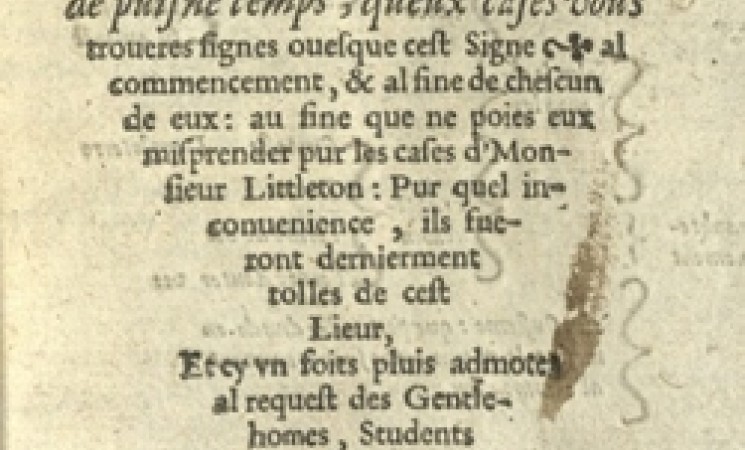Learning the Law: Littleton's Tenures

In Sir Thomas Littleton’s (1407-1481) time, materials for the study of law were scarce. Littleton orginally wrote the Tenures in order to help his son in his study of the law. It soon became the standard legal textbook on property law.
Sir Thomas Littleton. Les tenures de Monsieur Littleton. London: Richard Tottel, 1591

This edition of the Tenures is particularly well suited to the student. Its size allows it to be relatively cheap as well as portable, and the extra wide margins allow for copious note taking. This copy has clearly passed through the hands of multiple owners, each of whom had plenty of room for annotations.
Sir Thomas Littleton. Littleton’s tenures, in French and English. London: Printed by John Streater, James Flesher, and Henry Twyford [et al.], 1671.

This pocket edition presents Littleton in the original Law French side-by-side with the English translation. After the Norman Conquest in 1066, Law French became the official language of the English courts for nearly 700 years. Near the end of this period, when Law French had all but ceased to be a spoken language, bilingual volumes like this were especially popular. They allowed the student to study the content of the law while also brushing up on the language skills that were still needed.
Sir Thomas Littleton. Littleton’s tenures: with notes explanatory of the text of Littleton, and showing the recent alterations in the law. London: R. Hastings, 1846.

This student edition of Littleton’s Tenures was published in 1846 by the editors of The Law Students’ Magazine. In the preface, the editors – obviously aware of the priorities of law students – lauded their edition for removing all the obsolete parts of the text, both so that students wouldn’t get bogged down in unimportant details, but also to make the work as inexpensive as possible.
Sir Edward Coke. The first part of the Institutes of the lawes of England: or, A commentarie upon Littleton. London: Society of Stationers, 1628.
Gift of William L. Frost, Yale Law Class of 1951.

Littleton’s Tenures was the most important textbook on English property law until the appearance of Coke’s commentary on Littleton, in which Coke “shoveled out his enormous learning in vast disorderly heaps” in the margins around Littleton’s text. Coke on Littleton was the most read legal textbook in America until Blackstone, and possibly the most hated. Of his early legal studies, Justice Joseph Story remembered, “I was hurried at once into the intricate, crabbed, and obsolete learning of Coke on Littleton. … After trying to read day after day with very little success I set myself down and wept bitterly.”
–Ryan R. Martins, Rare Book Fellow
“Learning the Law: The Book in Early Legal Education” is on display October 1 to December 14, 2018, in the Rare Book Exhibition Gallery of the Lillian Goldman Law Library, located on Level L2 of the Yale Law School (127 Wall Street, New Haven CT). The exhibition is open to the general public 10am-6pm daily, and open to Yale affiliates until 10pm.
A full catalogue of the exhibit can be found here: https://digitalcommons.law.yale.edu/amlaw/18/


